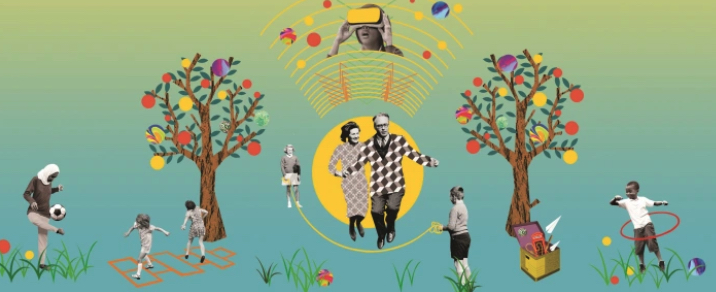Playtimes, Archives and now…a Play Observatory: How we got here!
John Potter explains how we got to the Play Observatory by way of two previous projects on play archives and playgrounds.

Each team member has different interests in aspects of play and you can find out more by following the Team link. However, we have all, at one time or another, been involved in projects which collect children’s play and games. Some of us have also been involved in helping to bring an archival collection made by Peter and Iona Opie to people’s attention and to see if we can collect things in similar ways, but updated for the digital age. The Opies were fascinated by play and made a huge collection over a number of decades, recording what children said about their games. Like them, we are really interested in hearing from children themselves about their world and their games. We think it’s important that they have a voice in this!
First, there was the Playtimes Project, with the British Library, in which the sound recordings collected by the Opies were presented, alongside children’s contemporary games. This was also a collaboration between the UCL Institute of Education and the University of Sheffield School of Education, led by Professor Andrew Burn and Professor Jackie Marsh, funded by the Arts and Humanities Research Council (AHRC). The site is still there and is a treasure trove of information about games of the past and present, partly curated by children, and partly by adults. You can see some of the original videos that were collected and stories of games from people like Michael Rosen on there.
Then, there was Playing the Archive, funded by the Engineering and Physical Sciences Research Council (EPSRC), which aimed to do a number of things: catalogue and display the original drawings and descriptions of games in the Opie Archive, introduce them to a new audience at festivals of play, collect children’s opinions and reflections on them, ask children to discuss and describe their own play in these times, and explore how new technologies like AR and VR could help bring the collection to life. Once again, Andrew and Jackie were involved, alongside some of the present team and teh website is still up wiht full details. We found there was huge interest in that project, particualrly in the work with children as researchers, and we made a couple of radio shows with Emmy the Great about them, including one on playground games.
So here we are, with the next step to both of those projects with the Play Observatory. Our aim is to collect stories of play and games which are about the kind of play which is going on in the difficult circumstances in which we find ourselves. Previously, of course, we were able to go into schools and playgrounds and talk with children about their play and invite them to research with us. Now, we need to ask for help at a distance! But we think it’s important that people don’t forget that play is still going on, even now, even if it’s in different ways to ‘normal’.
We are excited to be joined in this venture by experts in play and archival work such as Steve Roud, Laura Walsh from Great Ormond Street Hospital and Jonnie Robinson at the British Library. We will also be working in the closing stages with the V&A Museum of Childhood. Our partners will contribute their thoughts to this site over the next few months.
We hope you can play a part in our work and help us to make a unique play collection. Kate Cowan has more on this here.



